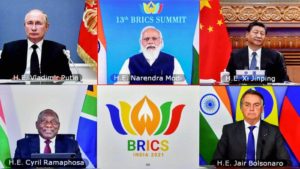
Leaders of BRICS nations on Thursday adopted a declaration in which they committed to combating terrorism including cross-border movement of terrorists, and terrorism financing networks and safe-havens.
The 16-point decalartion–New Delhi Declaration–was adopted at the conclusion of the virtual BRICS leaders summit. The meeting was chaired by Prime Minister Narendra Modi.
All the leaders of BRICS nations –Brazil President Jair Bolsanaro, South African President Cyril Ramaphosa, Russian President Vladimir Putin and Chinese President Xi Jinping— were present during the meeting. They held discussions on important regional and global issues including Afghanistan, terrorism and COVID-19.
“We discussed important regional and global issues. Thanked BRICS partners whose support helped India’s chair achieve many firsts. BRICS agenda now spans culture and communications; sports and space; disaster resilience and digital health; employment and environment, and more,” PM Modi tweeted.
“Today we are an influential voice for emerging economies of the world. This platform has also been useful for focussing attention on the priories of the developing nations as well,” he added.
At the conclusion of the summit, the New Delhi Declaration was adopted.
In the document, the BRICS leaders highlighted the need for cooperation on the study of origins of the SARS-COV-2 – an important aspect of the fight against the COVID-19 pandemic.
They “called COVID-19 extensive immunization as a global public good. Recognized the importance of experience and knowledge-sharing on Traditional Medicines”.
They also underscored the priority of fighting terrorism, including preventing attempts by terrorist organisations to use Afghan territory as a terrorist sanctuary and to carry out attacks against other countries.
“They committed to combating terrorism in all its forms and manifestations, including the cross-border movement of terrorists, and terrorism financing networks and safe-havens,” the declaration said.”
On Afghanistan, BRICS leaders called refraining from violence and settling the situation by peaceful means in Afghanistan, through an inclusive intra-Afghan dialogue so as to ensure stability, civil peace, law and order in the country. They underscored the priority of fighting terrorism, including preventing attempts by terrorist organisations to use Afghan territory as a terrorist sanctuary and to carry out attacks against other countries,” it said.
The leaders emphasised the need of addressing the humanitarian situation and upholding human rights, including those of women, children and minorities.
The leaders pledged resolve towards strengthening and reforming the multilateral system to make global governance more responsive and agile, effective, transparent, democratic, representative and accountable to Member States.
The BRICS leaders acknowledged that the continued relevance of the UN system would be determined by its ability to adapt to contemporary realities.
They pledged resolve to strengthen and reform the multilateral system to make global governance more responsive and agile, effective, transparent, democratic, representative and accountable to the member states.
On climate issues, the leaders expressed commitment to full implementation of the UNFCCC, its Kyoto Protocol and Paris Agreement, and to the principles of UNFCCC including ‘Common But Differentiated Responsibilities and Respective Capabilities’ in the light of different national circumstances.
In his opening remarks at the 13th BRICS Summit, Prime Minister Modi said the BRICS platform has been useful for focussing attention on the priorities of the developing countries.
“It is a matter of great pleasure for me and India to chair this summit for the 15th anniversary of the summit. India has received full cooperation from all BRICS partners during its chairmanship. I am deeply grateful to all of you for this. The BRICS platform has witnessed several achievements in one and half decades,” he said.
Meanwhile, Chinese President Xi Jinping said BRICS has become an important force on the international stage and the member countries have supported multilateralism and taken part in global governance in the spirit of equity justice and mutual assistance.
Xi said the member countries have made progress in various areas in the spirit of pragmatism.
Vladimir Putin said that Afghanistan should not become a threat to its neighbouring countries and stressed that the US withdrawal has led to a new crisis in the region.
Putin said, “Afghanistan should not become a threat to its neighbouring countries, a source of terrorism and drug trafficking.”
( With inputs from ANI )




 Driving Naari Programme launched in Chandigarh
Driving Naari Programme launched in Chandigarh






























